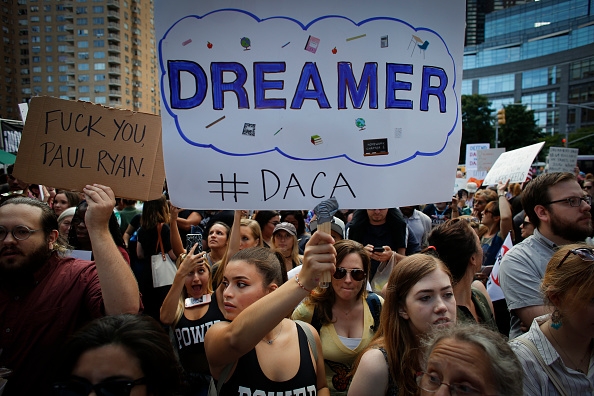You have /5 articles left.
Sign up for a free account or log in.

Getty Images
Could college admission help sway a statewide election?
Tomorrow both New Jersey and Virginia will elect governors, the only states to do so in this federal election off year. Pundits across the nation will watch the races closely and try to interpret them as referenda on the Trump presidency.
That is particularly true in my home state, Virginia, where Democratic Lieutenant Governor Ralph Northam is opposing Republican Ed Gillespie. Democrats currently hold all three statewide offices and both U.S. Senate seats, and Northam will be trying to continue a win streak that stretches back to 2009 in what has become a purple state. Gillespie, who nearly upset U.S. Senator Mark Warner in 2014, is trying to follow in the footsteps of the current governor, Terry McAuliffe, in moving from national political operative to elected politician.
To no one’s surprise, this fall’s campaign ads haven’t contributed to raising the level of thoughtful discourse about the direction of the commonwealth and the nation. If you believe ads for Northam, Gillespie was the brains behind the Enron scandal, whereas ads for Gillespie imply that Northam is a member, or at least an honorary member, of the gang MS-13.
It was an ad for one of the other statewide offices that caught my attention as potentially relevant for “Ethical College Admissions.” Democratic Attorney General Mark Herring is running for re-election against Republican John Adams.
Shortly after assuming office in 2014, Herring issued controversial legal opinions on two high-profile issues. He first announced that he would not defend Virginia’s ban on same-sex marriages, a ban supported by 57 percent of voters in a 2006 referendum that amended the state constitution to define marriage as only between a man and a woman.
It is the second issue that is of more interest to “ECA” readers. In April 2014 Herring announced that Virginia students covered by Deferred Action for Childhood Arrivals and who met the state’s residency requirements would also qualify for in-state tuition benefits. It was estimated at the time that Herring’s decision would make college affordable for up to 8,000 of those students who lack legal documentation to remain in the U.S. Herring was also among the 20 state attorneys general who co-signed a letter to President Trump back in July urging the administration to maintain the DACA program.
Adams, the Republican candidate, highlighted Herring’s DACA support in a television ad, arguing that he would not allow DACA student immigrants to take admission spots at Virginia’s public universities from tax-paying residents. The “illegal immigrants are taking our college admission places” argument is an interesting twist on the classic anti-immigrant talking point “illegal immigrants are taking our jobs.”
Adams claims not to be a politician, but the ad demonstrates that his political instincts are pretty good, because concern about admissions underrepresentation at elite public institutions like the University of Virginia and the College of William & Mary have long been hot-button issues in the populous suburbs of Northern Virginia.
The issue of how to deal with students who are children of undocumented immigrants (often known as Dreamers) raises serious philosophical and policy questions that are microcosms of the debate over immigration itself. Where is the balance between policy and pragmatism? What societal rights and privileges should those who come to the United States illegally have, and does providing benefits for their children render the legal immigration process irrelevant? Is the move to tighten borders and restrict immigrants in America’s strategic interest, a turn away from American ideals, or both? Should immigration policies be carried out through legislation or by executive order?
Those issues are complicated enough, but they are even more complex and nuanced when dealing with students covered under DACA. The students are in this country not by their own choice but as a result of choices their parents made. A fundamental principle of ethics is that individuals should not be held morally culpable or punished for things they didn’t choose. These young people have grown up in this country, and they are culturally Americans. They have been educated here, contribute to our economy and some even protect us through military service.
But should they receive in-state tuition benefits? Receiving in-state tuition is not necessarily a right for those who are not citizens, although Herring’s legal opinion in 2014 argued that the students qualified because they have “domicile” in Virginia. Close to 20 states allow undocumented students to receive in-state tuition, so Virginia is hardly alone. The statements I have seen from the Republican candidate Adams do not argue the wisdom of the issue itself, but rather criticize Herring as well as President Obama for “executive overreach.”
One’s position on the issue may depend on whether the in-state benefit is considered an entitlement or an investment. In ethics there is a distinction drawn between acts that are morally obligatory and those that are morally praiseworthy. Providing in-state tuition benefits to DACA kids may not be an obligation, but it may nevertheless be a good thing to do, both for the students and for society.
What about Adams’s claim that Herring has taken admission spots in public universities from Virginia residents and given them to illegal immigrants? Information from the State Council for Higher Education in Virginia (SCHEV) reveals that in 2016-17 there were close to 1,300 DACA students enrolled in Virginia’s public colleges and universities. Approximately 850 of them were enrolled in the community college system, which is open enrollment. Most of those enrolled in four-year institutions attend colleges that do not have any limit on in-state enrollment, so they are not squeezing out other Virginia applicants. The SCHEV data suggest that 50-60 Virginia residents are impacted by the ability of DACA students to get in-state tuition -- hardly a crisis.
The crisis, of course, is that neither Congress nor the Trump administration has a plan for how to deal with DACA students. Will we embrace them as citizens or make them return to “home” countries they have no memory of? Think about those students when you watch the election returns for the Virginia attorney general’s race tomorrow night.








